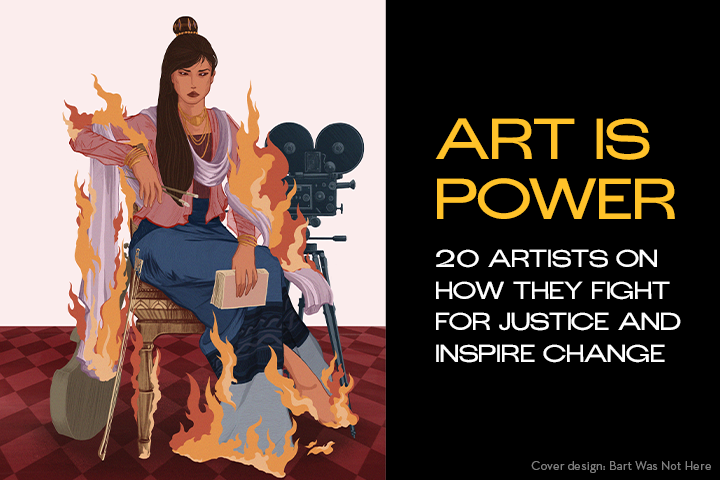Art Is Power: 20 Artists on How They Fight for Justice and Inspire Change

- Socially engaged artists are true artists who are as talented and committed to their craft as other artists, and thus are deserving of support from the art world; and
- Socially engaged artists are deserving of the same protections afforded to human rights defenders because they use creative expression to engage with and defend human rights issues, and create space for others to vindicate their own human rights.
“This report is a powerful testament to the importance of solidarity and community. It’s a reminder to socially engaged artists around the world that we are not alone—we are part of a vibrant and beautiful community of creative individuals who can and do work together to change the system.”
– Paul Rucker, American multimedia visual artist, composer, and musician
- To advance reform and develop protective mechanisms for at-risk artists, it is critical for the international community to recognize the crucial role of socially engaged artists in social and political movements.
- Through their art and activism, socially engaged artists use creative mediums to raise awareness of human rights issues, mobilize social and political movements, and advocate for change. These artists are therefore deserving of the same protections afforded to cultural rights defenders and must be protected under the human rights defenders’ international human rights framework.
- Human rights organizations and art organizations share a joint responsibility to support and protect at-risk artists and should expand their programming and resources to reach socially engaged artists.
- In sharing responsibility, it is critical for art and human rights organizations to optimize information sharing, collaboration, and coalition building and to develop a targeted, focused policy reform agenda that defines artistic freedom and guarantees artists’ safety and well-being.
- ARC urges all parties to pay urgent attention to the risks faced by artists and cultural professionals globally.
- ARC calls on states to evaluate their policy frameworks, ensure comprehensive protections for artists, and establish and extend effective support mechanisms such as dedicated immigrant pathways and residency opportunities.
- ARC urges states and multilateral institutions to develop a UN Action Plan for the Protection of Artists recognizing the role socially engaged artists play in creating a more open society, and ensuring their right to access protective mechanisms under international human rights frameworks.
- ARC calls for a more comprehensive approach to implementing the Declaration on Human Rights Defenders.
- ARC calls on multilateral institutions to proactively monitor and address violations of artistic freedom and to collaborate with art and cultural organizations to better support at-risk artists and understand their needs.
- ARC urges art organizations to collaborate with human rights organizations and solicit their expertise on supporting vulnerable populations while expanding the support they offer to at-risk artists in the form of emergency grants, residency programs, and increased engagement with refugee artists.
- Bart Was Not Here, a Burmese visual artist who rose to prominence for his viral digital art series, Seeing Red, during Myanmar’s Spring Revolution in 2021. He was forced to flee the country after his car and studio were shot at and now lives in exile in the United States.
- Dashka Slater, an American author whose young adult novel, The 57 Bus, has been banned in schools and libraries across the United States for its depictions of LGBTQI+ youths and the criminal justice system. It is the 10th-most-banned book in Texas and the 35th-most-banned book in the United States.
- Fahmi Reza, a Malaysian graphic designer who has been arrested seven times for his artworks that deal with the country’s so-called “Three R’s”—race, religion, and royalty. He has accumulated hundreds of thousands of followers on social media for his “democracy classes” for young people, his political activism, and his searing commentary on Malaysian society.
- Omaid Sharifi, an Afghan “artivist” (artist-activist) who co-founded ArtLords, a street art collective that brought community members together to paint murals about human rights issues. He was forced to flee Afghanistan after the Taliban’s takeover in August 2021 and now lives in exile in the United States.
- Stella Nyanzi, a Ugandan poet who was arrested and sentenced to 18 months in prison for her provocative poems that criticized Ugandan Prime Minister Yoweri Museveni through the use of “radical rudeness.” She lives in exile in Germany.






